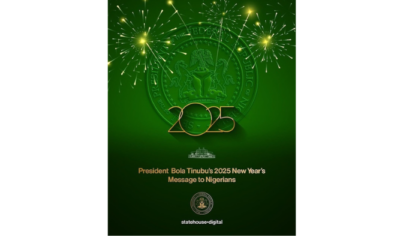News
Nigeria Reverts to “Nigeria, We Hail Thee” as National Anthem

President Bola Ahmed Tinubu has enacted the National Anthem Bill 2024 into law in a significant move. This legislation, which successfully passed its first and second readings in both the House of Representatives and the Senate, marks a return to Nigeria’s original national anthem, “Nigeria, We Hail Thee.”

The anthem was initially adopted when Nigeria gained independence on October 1, 1960, with lyrics written by British expatriate Lillian Jean Williams and music composed by Frances Berda.
The joint session of the National Assembly, held to commemorate the Silver Jubilee of Nigeria’s 4th Republic and the first anniversary of President Tinubu’s administration, saw representatives and senators proudly singing the reinstated anthem, “Nigeria, We Hail Thee.” President Tinubu later joined the session to officially confirm the anthem as the nation’s latest symbol of unity and pride.
The National Anthem of Nigeria, "Nigeria We Hail Thee," was sung for the first time today during a joint session of the National Assembly after it was enacted into law by President Tinubu. pic.twitter.com/eD5o21ygIy
— Imran Muhammad (@Imranmuhdz) May 29, 2024
The previous anthem, “Arise, O Compatriots,” had been in place since 1978 during Olusegun Obasanjo’s military administration. It was the result of a national contest with lyrics created by P. O. Aderibigbe, John A. Ilechukwu, Sota Omoigui, Eme Tim Akpan, and B.A. Ogunnaike, set to music by the Nigerian police band.
The debate surrounding the National Anthem Bill highlighted the lawmakers’ belief that “Nigeria, We Hail Thee” evokes a deeper emotional connection with the Nigerian populace. They argued that the previous anthem, being a product of a military regime, failed to capture the true aspirations of the Nigerian people.
Julius Ihonvbere, the sponsor of the bill, emphasized the importance of patriotism and nationalism. He stated, “The old anthem encompasses the energy, resourcefulness, and vision necessary for Nigeria. It instills pride in serving our nation, which is crucial at a time when many are seeking opportunities abroad. It asserts the sovereignty of our motherland.”
This change has sparked widespread reactions from Nigerians, reflecting a blend of nostalgia and hope for a united future. As the nation transitions back to “Nigeria, We Hail Thee,” the emphasis is on building a sense of national pride and identity.














Pingback: UAE Lifts Visa Ban on Nigerian Passport Holders - A Slice Of Naija
binance
September 18, 2025 at 3:46 pm
Thank you for your sharing. I am worried that I lack creative ideas. It is your article that makes me full of hope. Thank you. But, I have a question, can you help me?